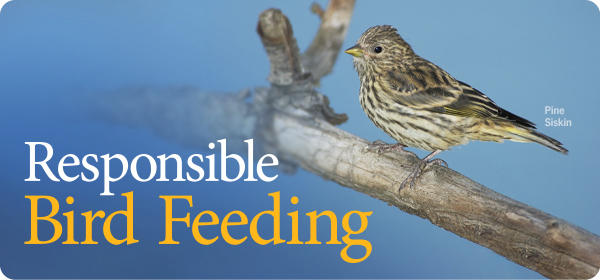Wild Birds Unlimited Recommends Responsible Bird Feeding
This past May a mysterious illness affecting several bird species made its way through several states in Mid-Atlantic and Mid-West including New Jersey. The true nature and cause of the illness remains unknown although many known avian diseases, bacteria and pesticides have been eliminated as potential causes. While states with higher rates of confirmed incidents recommended that feeders and baths be put away until the mortality event subsided, the NJ Division of Fish and Wildlife made the recommendation to only take down bird feeders and baths if sick or dying birds were seen on or in the vicinity of your property.
Over the course of July and August, confirmed reports of the mystery illness have fallen dramatically; leading scientists at Cornell Lab of Ornithology to believe with some certainty that, whatever the cause of the illness, it is most likely not a communicable disease (click here for article). Mortality reports have declined quickly across the states affected and several states that previously recommended bans on bird feeding have lifted any bans and recommended a return to bird feeding but increased efforts to keep feeders clean.
Such recommendations more closely match NJ Wildlife's recommendation of continuing to feed the birds but with greater attention paid to looking for sick birds and a more robust feeder cleaning regime.
With a greater diligence to the health of your backyard birds being the word of the day, we have a few suggestions that will both increase your enjoyment of the hobby while helping to reduce the likelihood of disease transmission around your feeder.
• Provide multiple feeding stations in different areas of your yard to disperse bird activity.
• Provide seed from a bird feeder rather than scattering it on the ground.
• Keep areas clean under and around your feeders.
• Keep fresh seed in the feeder and keep it from getting moldy
• Keep your seed dry by bringing in feeders during heavy rain events
• Replace seed if it gets overly wet
• Store seed in a cool dry place in rodent proof containers
• Clean your bird feeders regularly with a solution of one part bleach and nine parts water.
The following strategies will help improve the health and safety of birds when the spread of avian diseases is a concern.
• If feeder birds are exhibiting disease symptoms, then remove all feeders for a couple of weeks so local birds can disperse and utilize natural food sources.
• Clean and sanitize all bird feeders, bird baths and hardware with a 10% bleach (one part bleach to nine parts water) solution. Rinse thoroughly and allow to completely dry before refilling feeders. Continue to sanitize feeders every few days.
• Rake up and discard seed debris and bird droppings from the ground below and around feeders. Continue to clean these areas on a regular basis.
• Give the birds more space. If using multiple feeders, place the feeders farther apart from one another. This will reduce crowding, lower stress and lessen the potential for disease transmission between sick and healthy birds.
• Only use feeders that can be easily cleaned. Replace wooden feeders with ones made of plastic or recycled materials for easier cleaning.
• Bird feeders with cracks and crevices are difficult to sanitize and should not be used.
• Remove open tray and platform feeders that allow fecal material and food to come into contact with each other.
• Use antimicrobial bird feeders such as Wild Birds Unlimited EcoClean® Feeders. These feeders have built-in antimicrobial product protection on the treated surfaces.
• If finch populations are involved:
- Initially reintroduce foods and feeders that will not attract finches (suet, safflower, peanuts, hummingbird feeders, etc.).
- Reinstall finch feeders and food after an additional two weeks.
• Limit the amount of seed you provide. Offer only as much food as the birds will eat in a few days.
• Store all bird seed in rodent- and insect-proof containers to avoid contamination.
• Always discard any seed that has become wet, moldy or foul smelling.
• Avoid handling sick birds and always wash your hands with soap and water after filling bird feeders.
For other tips or questions, stop by our store and talk to one of our Certified Bird Feeding Specialists.


